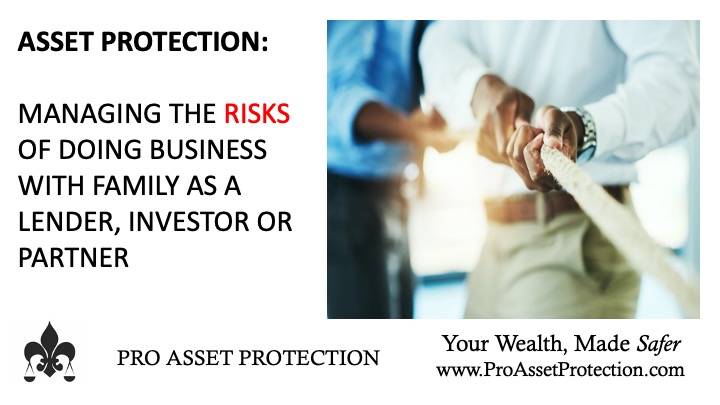
Asset protection issues for business owners and physicians aren’t contained by the walls of your business. A recurring risk I regularly deal with and answer questions on from clients is the effect of extended families and old-world cultural norms on asset protection plans.
Lost In Translation — When Old World Values Create Current Legal Risks
An issue I have dealt with for many years, including at least three times in the last two months alone, is the tendency for some individuals to hold jointly owned assets informally with other family members in some kind of “constructive trust”. While far from a scientific study, nearly two decades of practice in this area of law with a diverse national client base has clearly shown me that those from cultures that emphasize extended families (most commonly, Asian, South Asian, Middle Eastern, LatinX and Eastern European) and sharing of assets and labor tend to engage in investing as a family more often and with less formality (if any) than they should.
These business relationships take many forms including business loans to family members, hiring a family member to a run a business you own, being a passive investor in their business or co-owning a business or other asset (like real estate) with both capital and operational contributions.
These arrangements fall into several predictable fact patterns, including the following.
“I don’t own anything, my brother owns it”.
In some cases this is done as a poorly-conceived asset protection strategy, where the family assumes that keeping assets in the name of another family member who is not a physician keeps them safer from the physician family member’s professional liability.
“I own an apartment building and two rentals, in my brother’s name”.
Another common scenario is that the (often higher earning and more creditworthy) physician family member simply funds the businesses and real estate investments of other family members, including assuming onerous debt obligations, simply because they are able to do so, with an informal understanding that the doctor is a silent partner with an equity interest and/or who is owed some capital or profit share back at a future date.
“I own part of several businesses and real estate investments, with my family member”.
In other cases the physician themselves holds the assets in their own name and one or more family members have operational control and contribute labor. There is often a division of profits that the non-owner family member relies upon as a primary income source to support their own family and they have no formal claim or title to the business. This may be done for a variety of reasons including differences in the creditworthiness, financial sophistication and the existing creditors and financial difficulties of the other family member.
So What’s Problem?
All of these strategies present predictable and recurring legal and financial risks; here are the biggest ones.
1. Personal Liability. Regardless of who holds title, any property held personally by an individual is subject to all that person’s personal and professional liabilities including lawsuits, divorces, and bankruptcies. While holding the asset in a legal entity like an LLC may help protect it from some unrelated external liabilities, if the person in harm’s way is the sole owner of that entity, the income distributions that come out (including your share) are still fully exposed to their liability. The person holding the asset cannot assert.“ I only own this on paper for my sister the doctor and she really owns all or most of it,” as a defense.
2. Relationships and People Change. Doing business on a handshake, if executed by a lawyer, is called “malpractice”. Don’t be a victim of your own poor planning or risk assets you and your family have a right to based on the hope that the person you are trusting won’t ever be estranged, dishonest, develop a substance abuse issues or simply decide that they are “owed” some or all of the business for the work they put in. Regardless of your informal understanding the, owner of a business or other asset is who the paperwork says it is. Having to unravel a business, trace capital contributions and prove and agreement on terms of some sort of verbal contract is expensive, time consuming and comes down to a legally un-predictable “liars contest”.
3. Estate Planning. In many cases the person holding the asset may not have an estate plan in place or their estate plan may not specify that you are an owner or are holding a debt obligation related to the business. This means that the $200K you lent your sister-in law to open her business goes to her family, along with the business and the rest of her assets.
So What Should We Be Doing Better?
- Document Loans and Secure Your Interest While there are certainly many advisors that take the position that you shouldn’t do business with family members and should never lend family members money, many successful people do so out of both family obligation and in search of a return on their investment. If you are making a business loan to a family member, it’s important to carefully document the loan in a way that, as a minimum:
- Memorializes the borrower’s acknowledgment of the amount of the loan and the repayment term or obligation
- Addresses the minimum applicable interest rates and other terms of the loan required for the loan to be legitimate and legally compliant with IRS tax and gifting rules
- Provides a security interest for the loan that can include a collateral interest in the business’ assets, income and receivables as well a personal guarantee from the borrower
- Beware of Credit Obligations and Co-signing. In some cases you are lending your existing capital, in others you may be assuming debt obligations directly for capital or to finance the purchase of an asset or going business, either as a owner or partner or simply as a guarantor. Consider the risk carefully and be sure you understand if you are guaranteeing only a portion of the loan or if you can be collectible for the entire amount and if you are financially and legally prepared for and can survive a possible default.
- Have a conversation about money, then write it down. It’s important that both parties explicitly understand their roles and the expectations about compensation and profits. If you have a family member running a business that you own as your employee, agree to a rate of pay and make that relationship formal and legally compliant with all tax, wage and labor laws. Conflicts often arise when an operator thinks their salary is a “draw” or that their labor includes an equity position because these issues were never clarified.
- Formalize your ownership with paperwork. As an owner or investor you need legal documentation of your interest in the form of LLC membership interest or partnership or s-corp. shares, etc. for tax, legal and estate planning purposes. Without this paperwork the business does not belong to you despite any understanding or agreement you think is in place and will go the estates and creditors of the business’ official owners. This is especially true if your family is unaware of the details. Co-owned entities also need operating agreements that outline the owners’ agreements on operation, governance and profit sharing among other details. Your brother-in-law merely recording the LLC for the motel that you financed isn’t enough.
- Have a Separation Plan. Not every relationship is forever and if your family business is a partnership it needs a buy sell agreement just like any other that covers the basics like the ‘Five Ds’; the death, disability, departure, divorce or disqualification.
- Have a Continuity Plan. Many family businesses end or suffer when an operating partner or key employee that manages the business for their physician partner dies or is disabled. Consider how and if the business would continue and risk management like key man and disability overhead insurance.
Regardless of the specifics, you have more to lose than just the money you invested up front. Consider the following business planning checklist the bare minimum and then apply your own fact pattern for any industry specific risks. The details of successful family business operation fill books and magazines. This covers only the most basic issues and can’t replace professional guidance about your facts that can help protect both your investment and family harmony.

